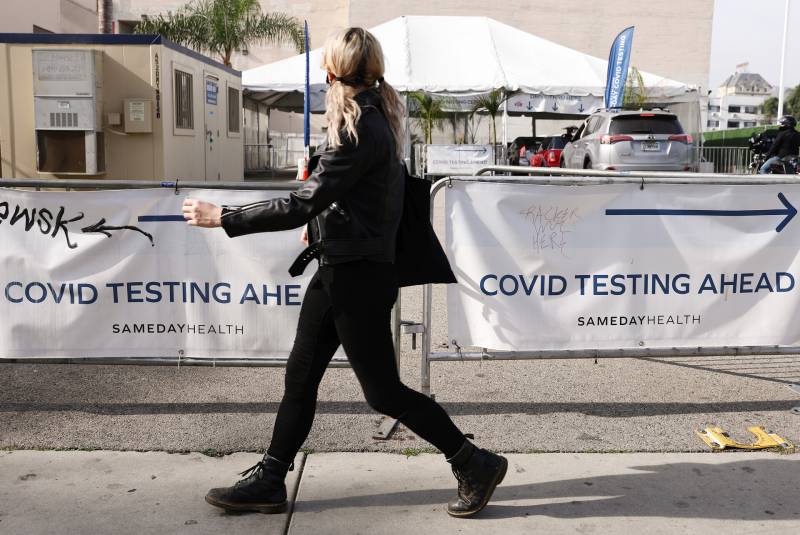Michigan's Dr. Krista Wigginton helped with the analysis and said the group's findings are "important evidence" but "not definitive proof" of omicron's presence in these places, noting that their "confidence will increase over time, if we see this marker increase and if it starts to appear in more communities."
Samples in eight other communities including San José, Palo Alto, Modesto and Gilroy did not find "detectable concentrations" of the mutations linked to omicron.
"We've seen it twice in Sacramento. We're going to keep looking at it in these communities. And if we see it continue to be present and start to go up, it's a really good indicator that it's circulating," Wigginton told KQED.
The sensitive scientific methods can detect as few as one or two cases per 100,000 people. Samples taken in Sacramento and Merced were just above this level, according to the researchers.
While the findings are suggestive, the mutation does exist in rare cases in other variants, including the alpha strain that was dominant earlier in the pandemic. Scientists don't expect those older variants to be in communities now but cannot rule them out.
The researchers notified Sacramento of the findings last Friday, Janna Haynes, a spokesperson for Sacramento Public Health, told KQED in an email.
"This is useful because wastewater surveillance is one of the tools that helps us identify new variants," Haynes said, in a statement. "We continue with other tools, including identifying specimens to prioritize for whole-genome sequencing, as we cannot [possibly] sequence every test result."
COVID-19 infections — even asymptomatic ones that never get tested — leave pieces of virus that show up in solid waste, which gets flushed to sewage treatment plants. That's where the research team, known collectively as the Sewer Coronavirus Alert Network, retrieve their samples.
The researchers are collaborating with 10 cities in northern and central California and the life sciences research company Verily.
Wigginton said that while wastewater analysis has been around for a while, it hadn't been used before the coronavirus pandemic in such a widespread manner. It's helped cities with coronavirus surveillance, building needed health-related evidence to anticipate where cases could surge.
Clinical coronavirus samples taken directly from people can take weeks to process, whereas wastewater analysis can come back in a day, according to Alexandria Boehm, a professor and Stanford environmental engineer who also works on the research team.
"We have been able to see the emergence of delta and alpha and mu variants," Boehm said. "Given the success we've had in the past using this tool, I feel confident that it's going to be useful to determine if omicron is present, circulating in our communities, before the clinical data can really tell us."
Early data shows that omicron variant may cause less severe disease
Meanwhile, across the world public health officials are trying to figure out just how worrisome — or not — omicron may turn out to be.
U.S. health officials said Sunday that while the omicron variant of the coronavirus is spreading throughout the country, early indications suggest it may be less dangerous than delta, which continues to drive a surge of hospitalizations.
President Joe Biden’s chief medical adviser, Dr. Anthony Fauci, told CNN’s “State of the Union” that scientists need more information before drawing conclusions about omicron’s severity.
Many patients hospitalized with the omicron variant in South Africa so far haven't needed supplemental oxygen, according to a report issued early Saturday by the South African Medical Research Council, which was reported by STAT. Few were admitted to intensive care or developed pneumonia, according to the report.
And reports from South Africa, where it emerged and is becoming the dominant strain, suggest that hospitalization rates have not increased alarmingly.
“Thus far, it does not look like there’s a great degree of severity to it,” Fauci said. “But we have really got to be careful before we make any determinations that it is less severe or it really doesn’t cause any severe illness, comparable to delta.”
Omicron had been detected in about a third of U.S. states by Sunday, including in the Northeast, the South, the Great Plains and in San Francisco. Wisconsin, Missouri and Louisiana were among the latest states to confirm cases.
But delta remains the dominant variant, making up more than 99% of cases and driving a surge of hospitalizations in the north. National Guard teams have been sent to help overwhelmed hospitals in western New York, and Massachusetts Gov. Charlie Baker issued an emergency order requiring any hospitals facing limited patient capacity to reduce scheduled procedures that are not urgent.
U.S. officials continued urging people to get vaccinated and to receive booster shots, as well as to take precautions such as wearing masks when among strangers indoors, saying anything that helps protect against delta will also help protect against other variants.
Gene Johnson for The Associated Press contributed to this report.

